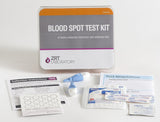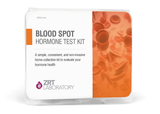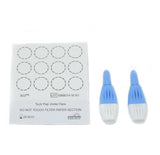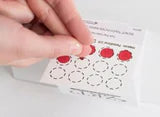Male Hormone Test Kit (PROFILE I) is for accurately testing the following eight essential hormones:
1- Estrone Hormone (E1)
2- Estradiol (Estrogen) (E2),
3- Prostate-Specific Antigen (PSA),
4- Progesterone (Pg),
5- Testosterone (T),
6- DHEA-S (DS),
7- Sex Hormone Binding Globulin (SHBG),
8- Cortisol (C),
Test Result: You will receive your test result 3-5 working days after the laboratory receives your sample. You will see your hormone levels in graphics and numbers on your test results. You will also see laboratory comments by Hormone Specialist PhD Dr in the comments: you will find an analysis of your hormone levels and what to do next.
- Collect samples from the comfort of your home and post them to our lab.
- The test must be used within 12 months after the purchase date.
- The test kit includes a laboratory fee: no additional laboratory cost or tax.
- Customers are responsible for shipping their samples to the laboratory.
Testosterone is the primary male hormone, and as men age, the levels of testosterone decrease. But age is not the only reason for a decline in testosterone levels; overtraining can also reduce levels.
This test can allow you to track your hormone levels and understand how they change over time or in response to dietary and exercise changes. Tracking your hormone levels over time can also tell you whether your hormone levels are decreasing with age.
Symptom Categories & Corresponding Symptoms – Male
Male Estrogen/Progesterone Deficiency Symptoms:
- Bone loss
- Depressed
- Heart palpitations
- Hot flashes
- Neck or back pain
- Night sweats and Sleeping difficulties
Male Estrogen Dominance/ Progesterone Deficiency Symptoms:
- Body temperature cold
- Irritable
- Irritably decreased
- Prostate problems
- Urinary urge increased
- Urine flow decreased Weight gain - breast or hips
Male Low Androgens (DHEA/Testosterone Deficiency) Symptoms:
- Allergies
- Apathy, Body temperature, cold
- Bone loss
- Burned out feeling
- Depressed, Erections decreased
- Fatigue – evening
- Fatigue – mental
- Fatigue – morning
- Flexibility decreased
- Forgetfulness
- Headaches
- Heart palpitations
- Hot flashes
- Irritable
- Joint pain
- Libido decreased
- Mental Sharpness decreased
- Muscle size decreased
- Muscle soreness
- Neck or back pain
- Night sweats
- Prostate problems
- Rapid ageing
- Ringing in ears
- Skin thinning
- Stamina decreased
- Stress
- Triglycerides elevated
Male High Androgens (DHEA/Testosterone Deficiency) Symptoms :
- Acne
- Aggressive behaviour
- Anxious
- Blood pressure high
- Hair or shin-oily
- Irritable
- Nervous
- Sleeping difficulty
- Sugar carvings
- Weight gain – breast or hips
Male Low Cortisol Deficiency Symptoms:
- Apathy
- Blood pressure low
- Blood sugar loss
- Body temperature cold
- Burned out feeling
- Chemical sensitivity
- Depressed
- Dizzy spells
- Fatigue – evening
- Fatigue – mental
- Fatigue – morning
- Infertility
- Irritable
- Joint pain
- Mental Sharpness decreased
- Neck or back pain
- Pulse rate slow
- Stamina decreased
- Stress
- Sugar carvings
- Swelling or puffy eyes/face
Male High Cortisol Deficiency Symptoms:
- Anxious
- Blood pressure high
- Body temperature cold
- Bones loss
- Depressed
- Erection decreased
- Forgetfulness
- Hot flashes
- Libido decreased
- Metal sharpness decreased
- Muscle size decreased
- Nervous
- Night sweats
- Rapid ageing
- Skin thinning
- Sleeping difficulty
- Stress
- Sugar carvings
- Triglycerides elevated
- Weight gain – waist
Male Hypometabolism :
- Anxious
- Body temperature cold
- Cholesterol high
- Constipation
- Depressed
- Dizzy spells
- Fatigue – evening
- Fatigue – mental
- Fatigue – morning
- Goitre, Hair – dry or brittle
- Headaches
- Hearing loss
- Heart palpitations
- Hoarseness
- Infertility
- Joint pain
- Libido decreased
- Nails – breaking or brittle
- pulse rate slow
- Ringing in ears
- Stamina decreased
- Sweating decreased
- Swelling or puffy eyes/face
- Triglycerides elevated
If you are experiencing any or a combination of those, it’s worth checking your hormone level imbalance using our comprehensive Male Blood Spot hormone test.
This test will enable you to find out about your hormone levels and, if necessary, take further action, such as seeing your doctor, changing your diet and exercising.
Why Profiles?
When patients have hormone-related symptoms, it is usually not a clear-cut case of one hormone level being abnormal or even one hormone system. In fact, because hormones play a role as chemical messengers to wake up the genome in specific target tissues throughout the body, it makes sense that all hormone systems work together to maintain a balance. This could be likened to the instruments in an orchestra playing together in harmony; when one instrument is off-key or playing too loudly or softly (analogous to too much or too little hormone), the overall harmony is affected. In a similar manner, the adrenal, thyroid, and sex hormones work in harmony, and when one or more of the hormones in any one system becomes unbalanced, this affects the harmony or balance of the whole system. Symptoms common to hormonal imbalances in the endocrine systems are seen as the body struggles to maintain balance but fails. Without an overall picture of which hormone systems are affected, it is often difficult to know the best clinical course of action for correcting the imbalance. Hormone “Profiles” at ZRT are multiple hormone tests bundled into one convenient kit. Priced lower than the sum of the individual tests, these provide a more economical method to assess a patient’s overall hormonal status, giving a better picture of the hormone imbalances causing symptoms. Instead of treating a secondary hormonal imbalance caused by an abnormality in only one of the hormonal systems (e.g., low libido caused by low testosterone), you can address the underlying issues at the root of the problem and, therefore, better guide your patients towards overall wellness.
The Problem with Andropause and Low Testosterone












